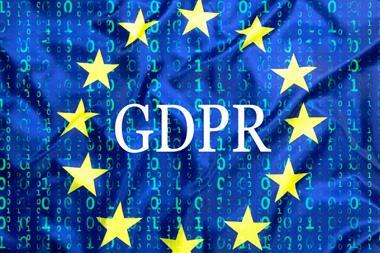With GDPR soon to be upon us, retailers need to understand the big changes it will bring to the way they use and analyse customer data.

The General Data Protection Regulation (GDPR) legislation significantly tightens the rules around businesses’ ability to process personal information, which will make the sharing and purchasing of raw customer data a far more complex and risky process.
As a consequence, GDPR will no doubt interfere with the ability of retailers to combine their knowledge and collaborate with other organisations to improve customer data.
However, if personal data is anonymised and analysed on an aggregate basis, then the compliance overhead is dramatically reduced.
“If personal data is anonymised and analysed on an aggregate basis, then the compliance overhead is dramatically reduced”
Aggregated data
Aggregated data is information gathered and expressed in a summary form for purposes such as statistical analysis, and so is not personal data for the purposes of data protection law.
It can provide exceptional insight for retailers that helps drive their business forward in a GDPR-compliant way.
For example, statistical insights can be used to build lookalike audiences for advertising and spot previously unnoticed shopping patterns.
What’s more, in Infosum’s recent ‘Exploring Data’ research, we found that consumers are much more comfortable for brands to use aggregated data, because they get the benefits of businesses sharing their data – including better products, services and communications – without the privacy concerns of individual targeting.
We discovered that:
- 80% of consumers are comfortable with brands using aggregated data to create products, in comparison with 68% for personal data
- 74% of consumers are comfortable with brands using aggregated data in marketing, in comparison with 55% for personal data
- 71% of consumers are comfortable with aggregated datasets being connected, in comparison with 49% for personal data
So, post-GDPR, retailers can continue to create and use syndicated datasets – where knowledge on customers is shared by a group of like-minded businesses – using anonymised and aggregated data to deliver the information they need.
Stringent data protection
The increased penalties under GDPR for data breaches have brought even greater focus to this issue.
Emerging technology allows companies to share insight, without sharing the actual data.
This means there’s no need to worry about those who have access to your customer data being able to copy it – or worse, leak it.
This technology has been built with data privacy and security at the forefront of its design.
“This means there’s no need to worry about those who have access to your customer data being able to copy it – or worse, leak it”
By ensuring all analysis is at a group statistical level, personal data rights are not affected.
With GDPR looming, this technology provides retailers with an effective and compliant way to deliver insight into their customers’ behaviour, while also protecting their data.
- For more information visit InfoSum
Danvers Baillieu is chief operating officer at InfoSum

WEBCAST Shaping insight together: the power of data collaboration
Join us on May 4 at 11.30am as we explore data collaboration in an interactive webcast session. You will get the chance to join the debate and share your views with our guest experts including:
- Former Tesco deputy chief executive and Eagle Eye boss Tim Mason
- InfoSum chief commercial officer Nicola Walker





























